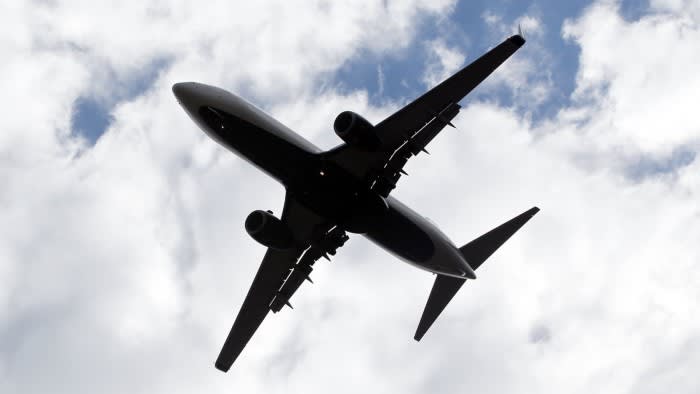Stay informed with free updates
Simply sign up to the Airlines myFT Digest — delivered directly to your inbox.
EU regulators have opened an investigation of 20 airlines over their potentially “misleading greenwashing practices”, including the claimed benefits of offsetting emissions from flying.
The European Commission said on Tuesday that it had written to the airlines and to national consumer protection authorities “identifying several types of potentially misleading green claims”.
The airlines were not named, but the national regulators involved are Belgian, Dutch, Norwegian and Spanish.
The regulators’ concerns centre on claims that the carbon emissions from flying can be offset either through investments in environmental projects or the use of more sustainable jet fuels, which still emit carbon when they are burnt but are less polluting than the kerosene that is currently used.
“The airlines are yet to clarify whether such claims can be substantiated based on sound scientific evidence,” the commission said.
Industry body Airlines for Europe said its members “recognise the importance of clear, transparent information about sustainability and our efforts towards achieving net zero carbon emissions”.
It said it was “particularly concerned” about the questions over sustainable aviation fuels, which it said have been “supported and endorsed” by the EU. “The science supports that this is a more sustainable alternative to regular jet fuel,” it added.
Airlines are facing growing regulatory scrutiny about their environmental impact and the EU has started a wider crackdown on green claims in corporate marketing.
Last month, a Dutch court ruled that flag carrier KLM had acted illegally when it claimed customers could “fly sustainably”, while the UK advertising watchdog in December banned adverts by three airlines.
Flying accounts for around 4 per cent of the EU’s greenhouse gas emissions and, despite an industry-wide pledge to reach net zero carbon emissions by 2050, it is seen as one of the hardest sectors to decarbonise because of the lack of alternatives to jet fuel.
Some airlines have set up schemes to allow passengers to contribute to carbon offsetting programmes or to the higher cost of sustainable aviation fuels.
But the commission said it had found a number of potentially misleading claims, including “creating the incorrect impression that paying an additional fee to finance climate projects with less environmental impact or to support the use of alternative aviation fuels can reduce or fully counterbalance the CO₂ emissions [from flying]”.
It also noted that airlines had made claims about plans to reach net zero emissions “without clear and verifiable commitments, targets and an independent monitoring system”.
It has written to airlines asking for proposals to address the concerns within 30 days, with a view to reaching an “agreed upon” set of changes. The national authorities have the power to sanction companies as a last resort.
The Science-Based Targets initiative, a voluntary standard-setting body that judges the quality of net zero targets set by industries including aviation, is divided about the benefits of using carbon credits to reach net zero emissions.
Under its existing rules, no major European airline has submitted a climate target ambitious enough to help limit global warming to 1.5C above pre-industrial levels, according to the group’s database. EasyJet, Gol, Iberia, Lufthansa and Wizz Air have all been removed from an SBTi validation process for their climate plans after failing to submit sufficiently ambitious targets.


